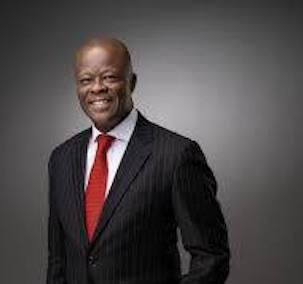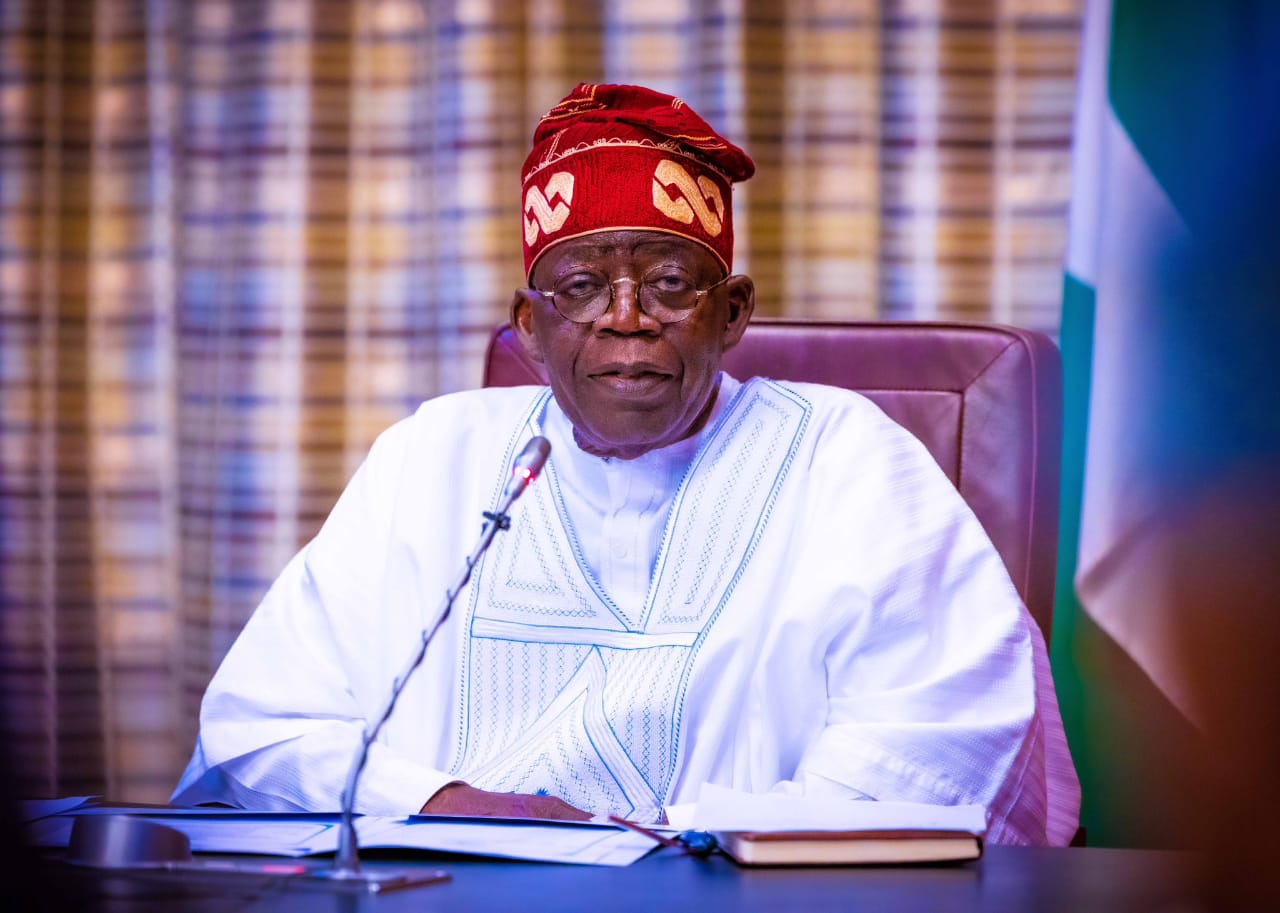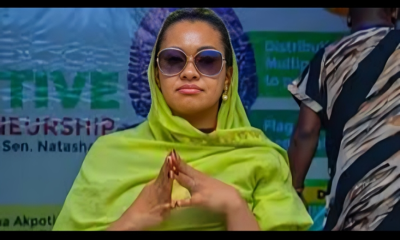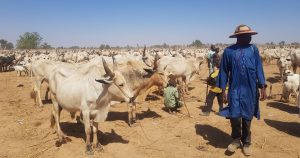COVER
Court Halts Army from Operation Positive Identification

… EFCC Witness Testifies via Video Link on Nyako Trial
By Armstrong Tseaa, Abuja
A Federal High Court in Lagos, yesterday ordered the Nigerian Army and its Chief of Army Staff (COAS) to suspend the ongoing Operation Positive Identification.
The presiding Judge, Rilwanu Aikawa, ordered both parties to maintain status quo pending the determination of substantive suit filed by Human Right Activist, Femi Falana, SAN.
Falana, a Human Right Activist, is seeking an order stopping the Operation Positive Identification of the Nigerian Army billed to have commenced 1st November, 2019.
The COAS, the Nigerian Army and the Attorney-General of the Federation are respondents in the suit.
None of the respondents was in court, when the matter was mentioned.
“The respondents had been served with the court processes and that the proof of service was in the court’s file”, Femi Falana told the Court. This was confirmed by the court.
However, Principal State Counsel from the Ministry of Justice, prayed the court to grant an adjournment to enable the Solicitor-General, Mr Dayo Apata, to handle the matter personally and also give the respondents time to harmonise their positions. Falana did not raise any objection.
The presiding judge granted his application, saying that “in view of the agreement between both counsels, I ordered the Nigerian Army and Chief of Army staff to maintain status quo, pending the determination of the case.”
He, thereafter, adjourned further proceedings till November 18, 2019.
Mr Falana contended that the planned nationwide operation which will run from November 1, to December 23, 2019, by which Nigerian citizens would be required to move about with means of identification is unconstitutional, illegal, null and void.
‘The operation violates my rights and that of other Nigerian citizens to liberty, as stated in Section 35 of the Constitution of the Federal Republic of Nigeria, 1999 as Amended and Article 6 of the African Charter on Human and Peoples Rights (Ratification and Enforcement) Act, (Cap A10) Laws of the Federation of Nigeria, 2004’, he further stated.
Consequently, he is seeking an interim order restraining the respondents from going on with the plan pending the hearing of the substantive suit.
In a supporting affidavit sworn to by a lawyer Mr Taiwo Olawanle, the plaintiff recalled that on October 8, 2019 the Chief of Army Staff, Lt.-Gen. Tukur Buratai disclosed that the Operation Positive Identification, said to be on going in the North East theatre of Boko Haram insurgency war would be extended to cover the entire nation.
He said the operation required Nigerian citizens to move about with legitimate means of identification such as the National Identification Card, Voters Registration Card, Drivers’ Licence and passports or other valid official identification.
EFCC Witness Testifies via Video Link on Nyako Trial
Also yesterday, the Economic and Financial Crimes Commission (EFCC) principal witness, Kobis Arithimni in the ongoing trial of former Governor of Adamawa state, Murtala Nyako over alleged N40 billion fraud, took a new dimension as he said he cannot come to Nigeria on health ground testify in the case
At a resumed trial yesterday, Arithimni, apologised to the court for being unable to come to the country to testify.
“I am a Christian and I am in London, receiving treatment,” he said.
He told the court that he was a commissioner in the Ministry of Rural Infrastructure, Adamawa, in 2007.
“In 2008 and 2014, I was appointed as the Secretary to the State Government.
“My duty was to coordinate the activities of the state government between ministries, parastatals and departments (MDAs) and to see to day-to-day smooth running of government,” he said.
Arithimni said he endorsed memos generated by permanent secretaries as regards funds before the governor’s office approved them.
“After the approval by the governors, the memos are brought back to my office and straight to the permanent secretary that generated the memo.
“The next stage is for the fund to be raised in the sum raised in the memo. Then, the funds would be released,” he said.
He said funds are raised after the voucher has been released by the accountant.
He said he knew one Maaji Iro, a manager of Zenith Bank, Yola Branch, who was also listed as a witness, adding that it was the governor who approved the memos for funds, said cheques were issued to Iro.
He, however, said he had at one time cautioned the permanent secretaries against given Mr Iro cheques without a copy of the approval of the memos.
“It is uncivil service like and to guide them, I told them that on no account should they give or issue cheques to Maaji Iro without a copy of the approval of the memos to serve as evidence that approvals were given,” he said.
In a cross examination, counsel to the 1st, 2nd, 4th, 6th, 7th and 8th defendants, Ibrahim Isiyaku, SAN, asked if Mr Arithimni recommended the release of the funds in respect of which the expenditures were to be incurred and he did not object.
“Your only problem now is that the money was not brought back to you, right,” Mr Isiyaku asked Mr Arithimni but he gave no response.
The lawyer noted that the witness told the court that Mr Iro was a banker and had no role to play in Adamawa government.
He, however, asked the witness if he would be right to say that Mr Iro manages the account of Adamawa State government in Zenith Bank and he concurred to Isiyaku’s statement.
On his part, counsel to the 3rd defendant, Yakubu Maikyau, SAN, asked Mr Arithimni if he knew one Ibrahim Emmanuel and the witness responded that he was a permanent secretary, political department, under his office.
Counsel to the 5th defendant, Olumide Olujinmi, only wished the witness quick recovery in London.
Speaking, prosecution counsel, Mr Jacobs, told Abang that he was sure that he would be closing his case in the next adjourned date.
“I do not want to formally announce that I am closing my case today but I am 99 per cent sure that I will close it in the next adjourned date,” he said.
When Mr Isiyaku called the attention of the judge to some motions they slated for hearing, Mr Abang said he would take them in the next adjourned date.
According to the judge, I will take all pending applications file by counsel on November 6.
Mr Abang, however, adjourned till November 13 for continuation of hearing based on the parties’ agreement.
COVER
Nigeria’s Capital Market Key to Achieving $1trn Economy – FG

By Tony Obiechina, Abuja
Minister of Finance and Coordinating Minister of the Economy Wale Edun has emphasized the crucial role of the capital market in achieving the nation’s ambitious goal of becoming a $1 trillion economy.Edun, who spoke at the Capital Market Committee (CMC) meeting, was represented by Minister of State for Finance; Dr.
Doris Uzoka-Anite highlighted the market’s transformation since 2015, with improvements in governance structures, new products and platforms, stronger regulatory environment, and growing investor participation. According to the Minister, the Implementation of the Capital Market Master Plan (2015-2025), has been instrumental in increasing the market’s contribution to the national economy, developing a sophisticated market structure, and improving competitiveness.Edun said the revised plan prioritizes digitalization, innovation, sustainability, inclusion, and capital formation, aligning with the broader economic reform agenda.He said the passage of the new act modernizes the legal and regulatory framework, streamlines enforcement mechanisms, and provides clarity on emerging areas such as digital assets and crowdfunding.On the challenges and opportunities inherent in the Act, the Minister said, it will help deepen market participation, as well as ensure regulatory coordination remains tight.On the government’s private sector innovation in creating the needed environment for businesses to thrive, the Minister noted that the government is committed to creating an enabling environment for private sector innovation to flourish within a fair and transparent environment.The Minister added that the market is expected to contribute to the economy, serving not only for capital raising but also as a vehicle for wealth creation, economic inclusion, and long-term national resilience.He explained that, with the Securities and Exchange Commission undertaking regulatory reforms, including joining the GBMC Network of IOSCO in promoting and implementing ISSB Standards amongst others, the domestic economy has recorded the fastest GDP growth in about a decade in 2024, driven by a strong fourth quarter and improved fiscal position.Earlier in his speech, the DG SEC, Dr. Emomotimi Agama, emphasized the Commission’s commitment to regulatory reforms and capital market growth.According to him the enactment of the Investment and Securities Act (ISA) 2025 marks the beginning of a transformative new era for the capital market.Agama highlighted the Commission’s efforts to deepen engagement with stakeholders, ensure widespread dissemination and understanding of the new law, and drive innovation and compliance.He also emphasized the importance of restoring investor confidence, bringing timely relief to aggrieved investors, and creating a platform for broad-based participation of Nigerians in wealth creation.The SEC boss noted that the Commission has constituted an implementation team to thoroughly engage with every provision of the ISA 2025 and set up a dedicated sensitization team to deepen public understanding of the new law. A podcast series has also been launched to simplify the ISA 2025 and make it accessible to all Nigerians.Agama highlighted the Nigerian capital market’s impressive performance in 2024, with the NGX All-Share Index increasing by 37.65% and market capitalization growing by 53.39%. He also noted the Commission’s efforts to enhance regulatory efficiency, promote market integrity, and protect investors.The SEC boss emphasized the importance of financial inclusion and investor education, citing the Commission’s initiatives to empower women, youth, and grassroots communities. He also highlighted the Commission’s commitment to technology-driven solutions, including the launch of an e-survey to assess emerging technology adoption in the Nigerian capital market.Agama concluded by emphasizing the Commission’s commitment to fostering growth, transparency, and sustainability in the capital market, and looking forward to fruitful deliberations at the meeting.The highlight of the CMC meeting was the unveiling of the ISA Act 2025 by the minister.COVER
FG Boosts Internet Access, Rolls out $2bn Fibre Network

By David Torough, Abuja
The Presidency on Monday said Nigeria’s Communications and Digital Economy sector attracted $191m in foreign direct investment in Q1 2024, a nine fold increase from $22m in Q1 2023.The Minister of Communications, Innovation and Digital Economy, Bosun Tijani disclosed this during an interview for an upcoming State House documentary marking President Tinubu’s second anniversary.
Special Adviser on Information and Strategy to the President, Bayo Onanuga, revealed in a statement yesterday titled; “Investment in Digital Economy Grows Ninefold, Rollout Of $2 Bn Fibre Optic Infrastructure Begins Q4: Bosun Tijani. ”Tijani highlighted the sector’s robust workforce development, driven by the three Million Technical Talent programme and revealed plans for a $2bn initiative to deploy 90,000 kilometres of fibre optic infrastructure nationwide, starting in Q4 2025.“These foundational reforms, coupled with advancements in artificial intelligence and the startup ecosystem, have positioned Nigeria as a global leader in the digital economy,” Tijani stated.Comparing FDI inflows, he said, “In Q1 2023, the sector had about $22m; by Q1 2024, with this administration well underway, we reached $191m. The trend continued in Q2, increasing from $25m in 2023 to $114 m in 2024.”According to the minister, the 3MTT programme, launched in October 2023 to create a tech-savvy workforce, has already trained over 117,000 Nigerians in digital skills, surpassing its initial target of 30,000.“By last year, we had already moved that to over 117,000. With an additional 35,000 in training, the programme is nearing 10% of its 3 m goal. And in the rest of the time in office, we hope to reach three million,” he said.Regarding connectivity, Tijani announced that Project Bridge, focused on deploying 90,000 kilometres of fibre optic cable, will commence in the fourth quarter.“We are preparing a $2bn investment to ensure every Nigerian can access affordable, high-quality connectivity regardless of location. Increasing connectivity hubs by just 10 per cent could yield a 2.5 per cent GDP growth,” he said.Tijani celebrated Nigeria’s ranking among the world’s top 60 countries for AI readiness and developing a homegrown large language model.He also highlighted the launch of the AI Collective platform, supported by leading partners including Pierre Omidyar, Google, and Microsoft, to foster collaboration and innovation in artificial intelligence.For the first time in the country, the ministry has funded 55 academic researchers to explore technology applications in agriculture, healthcare, and education. In addition, N300m was invested in 10 startups using AI and blockchain to enhance agricultural productivity.On the Nigeria Startup House in San Francisco, an initiative targeting $5 billion in startup funding, Tijani said, “Our goal is to attract $5 billion in investments for Nigerian startups, supported by the Startup Pact and Trade Desk initiatives, which will connect local tech firms to global opportunities and government procurement.”Tijani revealed that over 500 government technologists have been trained in AI and Digital Public Infrastructure, and the groundbreaking Digital Economy Bill has passed its first reading in the National Assembly.To bridge rural connectivity gaps, the Minister projected that 7,000 telecom towers would be deployed, targeting 98 per cent nationwide coverage, adding that the Federal Executive Council had already approved the project.He described the progress on Right-of-Way issues as a game-changer for the country, revealing that 12 states in the federation have adopted zero-rated Right-of-Way policies.According to him, these efforts will support the National Broadband Plan’s goal of achieving 90% penetration by 2025, up from 48% in 2024.He projected the sector’s GDP contribution to rise from 16 per cent to 22 per cent, stating, “If a sector can increase its contribution by three to four per cent to the GDP, we’re about to see the economic growth we’ve not seen before. Technology allows us to bridge the gap between governments and the people.”Tijani said the government is not chasing quick wins. “The results we want to provide for Nigeria are long-lasting reforms that will transform our economy for generations to come”.COVER
Abbas Recommends Israel, Brazil, Vietnam Revenue Diversification Models

By David Torough, Abuja
Speaker of the House of Representatives, Hon. Abass Tajudeen, has declared that Nigeria’s heavy dependence on oil revenue would continue to leave its economy vulnerable, noting that agriculture remained the most viable alternative to achieving resilience.
Abass made the declaration in Abuja on Monday at a one day public hearing on some Bills seeking the establishment of agricultural colleges and institutions. Represented by Chief Whip of the House, Hon. Ibrahim Isiaka, the Speaker said it was within this context that the establishment and expansion of Agricultural Research Institutions across the country are not only necessary but strategically urgent.He said Nigeria should “Emulate countries like Israel, Brazil, and Vietnam that have attained a significant leap in agro development by investing substantially in research and development.”According to him, Brazil’s Embrapa, for instance, reengineered an infertile savannah into a global food hub, just as Vietnam’s targeted agricultural reforms pulled vast populations out of poverty, while Israel continues to innovate in arid-zone agriculture through technology-driven methods.Chairman of the House Committee on Agricultural and Institutions, Hon. Isiaq Abiodun Akinlade, recalled how in the 60s and 70s, the country was among the major exporters of agricultural produce such as cocoa, cotton, palm oil, and groundnuts.The lawmaker noted that Nigeria, with a population size of over 220 million and still growing, is desirous of more agricultural colleges and research institutions to help proffer solutions to issues, “namely climate change, insecurity, pest outbreaks, soil degradation, unskilled labourers, and livestock management.”





























